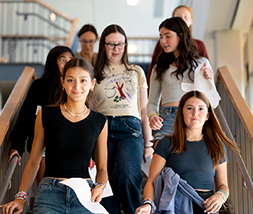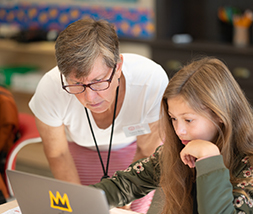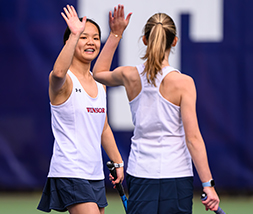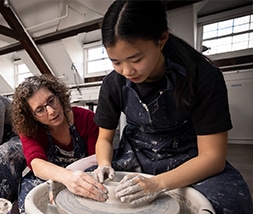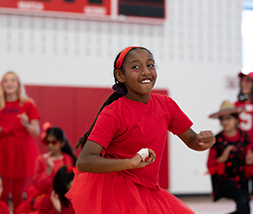Curriculum Guide
English
All Upper School students are required to take English each semester through Class VIII. All English courses are major courses.
Class V English (1 credit)
Students will read and discuss Romeo and Juliet, Their Eyes Were Watching God, Catcher in the Rye, and short stories from around the world. They will write frequently in a variety of modes, including literary analysis, visual analysis, personal narrative, and style imitation. The course emphasizes the writing process and includes regular lessons on grammar and style.
Class VI English (1 credit)
Students take a full year of United States Literature in conjunction with a full year of United States History. The course will ask questions about belonging in America. What does it mean to be an American? Who tells the story of America, and how is it being told? Who are the main characters in that story, and who is marginalized? To help us answer these questions, we will read texts from a variety of genres, voices, and time periods. Students will also practice writing in a variety of modes.
Class VII English
Students take a one-semester elective course in the literature of a country or region outside of the United States or western Europe in conjunction with a matching history course. Students have five offerings from which to choose: Africa, India, Russia, Latin America, and the Middle East. For their other semester of English, students choose from electives that explore engaging themes and that include a wide range of voices and genres. See elective choices below.
Class VIII English
Students choose two semesters of English study from a selection of electives in literature and writing. See elective choices below.
Class VII Semester 1 Electives
Indian Literature (0.5 credits, fall)
“Incredible India,” the alliterative title of a recent campaign to bring tourists to the country, has an attractive ring. And indeed there is much to admire about this naturally beautiful, diverse, artistically rich country that claims the title of world’s largest democracy. But India also struggles with gender inequality, religious strife, caste discrimination, government corruption, and challenges to democratic freedoms. Designed to be closely linked to the curriculum of the Indian History course, this course will begin with a study of the ancient, but still influential epic The Ramayana, a foundational work of the Indian and Hindu canon. We will then examine the hopeful writings of Tagore and Nehru as they imagined an independent, inclusive India in the early part of the 20th century. We will also explore some of the causes and effects of religious conflict and communal violence in contemporary India through short stories about the Partition of India and Pakistan and through the play Final Solutions by Mahesh Dattani. Using literature, articles, podcasts, and film, we will explore India’s social, economic, and political challenges and opportunities. We will also discuss the capacity of art to raise awareness and to effect change. This course will join with its History counterpart for an interdisciplinary research project. This course fulfills the global studies requirement.
Middle Eastern Literature (0.5 credits, spring)
“The Middle East” is a slippery construct that seeks to encompass a geographic area that cannot be understood through a single unified culture, language, ethnic identity, or religious experience. As we sample the vast and varied literature of this region, we will look for meaningful areas of continuity, taking up questions of reading in translation, the social role of the poet/author, narrative constructions of national identity, claims about politics and good governance, the challenges of modernity and colonialism, and gender roles. After beginning with one of the oldest extant works of literature, the Mesopotamian Epic of Gilgamesh, students will turn to pre-Islamic poetry, the Qur’an, Sufi poet Rumi, and a unit on Egyptian Modernism. As time permits, we will enrich our investigation of the literary and cultural landscapes by considering works of visual art and film such as those by Shirin Neshat and Youssef Chahine. This course will join with its History counterpart for an interdisciplinary research project. This course fulfills the global studies requirement.
Feminist Perspectives in Literature (0.5 credits, fall)
This course will take an interdisciplinary approach to feminist literature: we will use our reading of not only literary but also historical and cinematic texts to explore the development of feminism in the United States and to interrogate the complex interrelation of race, class, sexuality, and gender as part of that development. Focusing specifically on issues of intersectionality and challenges to the gender binary, we will look at texts that not only document gender oppression but also imagine revisions to and liberations from conventional narratives. Students will write both analytically and creatively and will learn the skills involved in film analysis. Readings might include: Margaret Atwood’s novel The Handmaid’s Tale or Ali Smith’s novel Girl Meets Boy; the collection of essays and poetry This Bridge Called My Back: Writings by Radical Women of Color; short stories by Charlotte Perkins Gilman, Emma Donohue, Ursula K. LeGuin, and Maxine Hong Kingston; and the films Thelma and Louise, Confirmation, and Barbie.
Literature and the Mind (0.5 credits, fall)
In this course, we will explore the ways writers, painters, and filmmakers have sought to plumb the depths of the human psyche and to represent that exploration. We will touch on theories of the unconscious, repression, self-deception, and trauma, and we will situate the artistic texts in their societal contexts and look at the way gender, race, and class play a role in the representation of the mind as well. Assignments will include both analytical essays and creative pieces in which students will experiment with their own portrayals of the mind’s workings. Our first unit focuses on the way repression can lead to a divided self; our texts will be Robert Louis Stevenson’s horror classic Strange Case of Dr. Jekyll and Mr. Hyde and Charlotte Perkins Gilman’s eerie short story “The Yellow Wallpaper.” The second unit centers on self-deception and the narratives people tell themselves to stay sane or to cover their misdeeds; here, our central texts will be the film Memento and poetry by Robert Browning, Richard Howard, Christina Rossetti, and Margaret Atwood. In the third unit, we will continue our work with visual texts by considering the liberation of the imagination in the paintings of Surrealist artists Remedios Varo, Dorothea Tanning, Leonora Carrington, and Frida Kahlo. Finally, we will explore the intersection of race, sexuality, identity, and the mind; we will look at poems by Danez Smith, Rajiv Mohabir, and Terrance Hayes and focus our analysis on two recent films, Get Out and Moonlight.
Contemporary American Fiction: Constructing American Masculinity (0.5 credits, fall)
Cultural critics periodically ask whether American men are in crisis. Well, are they? This course will examine the ways in which various forms of literature—from the novel to hip hop—have shaped and reflected American conceptions of masculinity since the mid-19th century. First, we will examine assumptions about masculinity and violence in football and in the idea of the cowboy, and students will create their own podcasts. Texts will include excerpts of Friday Night Lights, all of Cormac McCarthy’s novel All the Pretty Horses, Annie Proulx’s story “Brokeback Mountain,” and Ang Lee’s film adaptation of the short story. Having used these works to unearth assumptions about race and gender, the class will look more specifically at this intersection for Black American men and masculinities. Creators will include August Wilson (Fences), Ralph Ellison (“Battle Royal”), Robert Hayden, Richard Baldwin (“Sonny’s Blues”), Barry Jenkins (Moonlight), and Kendrick Lamar. Finally, the class will turn its attention to works that trouble the boundaries around the definition of masculinity, with an emphasis on works by trans men like Ari Banias and nonbinary authors. What does and what should masculinity mean to us today? If you’re interested in these questions, come help us figure out the answers—or at least better questions.
Class VII Semester 2 Electives
African Literature (0.5 credits, spring)
One of the first questions we will consider in this course is how to approach studying the literature of an entire continent in a single semester. We will also examine how the very notion of African Literature is shaped by cultural and economic forces. Course texts will focus much of our attention on the effects of colonialism and the formation of postcolonial literary voices. Those texts may include Chinua Achebe’s canonical Things Fall Apart; the oral epic Sundiata; short stories from Apartheid-era South Africa by Alex La Guma and others; and a contemporary African film. This course will join with its History counterpart for an interdisciplinary research project. This course fulfills the global studies requirement.
Latin American Literature (0.5 credits, spring)
Foreigners, natives, conquistadores, explorers, novelists, guerrilla fighters, indigenous activists and tourists are just some of the people who have marveled at Latin America’s rich landscape. For writers as diverse as Columbus, Rosario Castellanos, Gabriel García Márquez, and Che Guevara, nature has played a pivotal role in their imagining of the region. As one way into understanding the complexities that make up the idea of Latin America and its vast body of literature, we will explore, among other topics, different authors’ approaches to the natural world within varied geographical and historical contexts and across a variety of genres. As we investigate different texts, we will consider the relationship between studying history and literature: What are issues of representation within each field? How can we understand texts in their historical context and use “literary” texts to inform our historical interpretation? This course will join with its History counterpart for an interdisciplinary research project. This course fulfills the Global Studies requirement.
Russian Literature (0.5 credits, spring)
In this course, we will explore the contested development over the last two hundred years of a distinct Russian identity, with a focus on the stories Russians told about themselves with regard to socioeconomic class, gender, power, and morality. The course is designed to work in tandem with the Russian History course, and the overarching theme of both classes will be the interaction—and the conflict—between the individual and the state; often, we will encounter literature that challenges the narrative the state is creating about what it means to be Russian or about the reality of Russians’ experience of their society. Our first unit will center on short works from the 19th century (a poem by Alexander Pushkin, short stories by Nikolai Gogol, Mikhail Saltykov, and Anton Chekhov, and a novella by Leo Tolstoy) that represent different facets of Russian identity in relation to social class, geographical location, and conscience. From there, we will explore Soviet propaganda and the realities beneath those idealistic portrayals, with an emphasis on the experiences of women; our literary texts will include a memoir about growing up as a young girl in the Soviet era, a dystopian short story critiquing late-Soviet life from the perspective of a teenage girl, and a long-form poem that seeks to speak the truth of life for women under Stalin. This course will join with its History counterpart for an interdisciplinary research project. This course fulfills the Global Studies requirement.
Contemporary American Fiction: Identity and Belonging (0.5 credits, spring)
With units exploring memoir, speculative fiction, poetry, and film, students in this course will examine diverse stories of belonging in American fiction. From the legacy of the Holocaust to contemporary immigrant experiences and imagined futures, we will trace the way individual identities relate to the communities they come from, exist in, or yearn for. Possible texts include Art Spiegelman’s graphic novel Maus, stories by Octavia Butler and N.K. Jemisin, poems and short works by Esmè Weijun Wang, Wo Chan, Rajiv Mohabir, Ha Jin, Susan Howe, Mark Salzman, and the film Everything Everywhere All At Once.
Literature and the Mind (0.5 credits, spring)
In this course, we will explore the ways writers, painters, and filmmakers have sought to plumb the depths of the human psyche and to represent that exploration. We will touch on theories of the unconscious, repression, self-deception, and trauma, and we will situate the artistic texts in their societal contexts and look at the way gender, race, and class play a role in the representation of the mind as well. Assignments will include both analytical essays and creative pieces in which students will experiment with their own portrayals of the mind’s workings. Our first unit focuses on the way repression can lead to a divided self; our texts will be Robert Louis Stevenson’s horror classic Strange Case of Dr. Jekyll and Mr. Hyde and Charlotte Perkins Gilman’s eerie short story “The Yellow Wallpaper.” The second unit centers on self-deception and the narratives people tell themselves to stay sane or to cover their misdeeds; here, our central texts will be the film Memento and poetry by Robert Browning, Richard Howard, Christina Rossetti, and Margaret Atwood. In the third unit, we will continue our work with visual texts by considering the liberation of the imagination in the paintings of Surrealist artists Remedios Varo, Dorothea Tanning, Leonora Carrington, and Frida Kahlo. Finally, we will explore the intersection of race, sexuality, identity, and the mind; we will look at poems by Danez Smith, Terrance Hayes, and Rajiv Mohabir and focus our analysis on two recent films, Get Out and Moonlight.
Class VIII Semester 1 Electives
Irish Literature: the Irish Literary Renaissance (0.5 credits, fall)
In this class, we will focus on the period of the late nineteenth and early twentieth centuries known as the Irish Literary Renaissance, a time when Irish authors and writers asserted the value of their own culture, especially their literature. We will read deeply in the poetry of William Butler Yeats, encounter some of Augusta Gregory’s and John Millington Synge’s dramas, read James Joyce’s Dubliners and A Portrait of the Artist as a Young Man, and may also sample some shorter fiction and poetry by Edna O’Brien and Seamus Heaney. We will also read a few concise historical texts and watch two films. To understand Irish literature, we need to understand some basics of Irish history. Ireland suffered under British colonial rule for upwards of seven hundred years; for much of that time, the Irish were seen as a different “race” from the English, and England’s colonial system actively worked to uproot Irish language, culture, and religion. Yet, in spite of England’s control and exploitation of Ireland’s resources, Irish culture—and especially Irish literature—survived to wield an influence that was out of all proportion to this island nation’s tiny population.
Literature of Ambition (0.5 credits, fall)
How much of our lives are shaped by our decisions and how much determined by forces outside of our control? Are we responsible for the unintended consequences of our actions? What brings someone to justify betrayal, and is it always possible to atone? We will explore two very different texts interested in characters who seek to exert power over their worlds with disastrous unintended consequences: Shakespeare’s Macbeth and Ian McEwan’s Atonement. We will also consider a variety of intertexts such as poems by Edna St. Vincent Millay, Ina Coolbrith, Durlene Westfall, and Lousie Imogen Guiney, excerpts from Jason Reynolds’ Long Way Down, and film adaptations of the two longer works.
Literature of Defiance (0.5 credits, fall)
Over three hundred years after the publication of Paradise Lost, Milton’s epic poem still offers up the surprise of a sympathetic Satan. His mission to corrupt human hearts should make him a villain (the villain), but this version of Satan has the courage to defy the entity that created him. That choice leaves him lonely and embittered, but it also makes him a complex character who reminds readers of their own struggles to become something apart from their creators. In this course, we will consider the creatures who defy their gods and creators. Satan will lead the parade of characters who question the authority of those higher powers and choose to create themselves. What does it mean to become a fully realized person (or spiritual adversary)? Does that realization happen only when one rejects their creator? Is paradise worth submitting to the whims and will of a higher power? What is the relationship between defiance and creativity? Texts for this course may include Milton’s Paradise Lost, Shakespeare’s The Tempest, and Ishiguro’s Never Let Me Go.
Postcolonial Literature: Empire Writes Back (0.5 credits, fall)
In this course, which builds on students’ experiences in global studies, we will first briefly explore the political, racial, cultural, and religious beliefs that fueled the development of the British Empire. How does the discourse of the time reflect both the ideology of empire and the latent cracks in its structure? We will then spend the majority of the course reading texts from authors in African, Caribbean, Latin American, and/or Indian regions that were colonized, as well as texts from contemporary British writers reflecting on Britain’s colonial heritage. Authors may include Smith, Kincaid, Said, Fanon, Friel, Rhys, Rushdie and others. This course will make connections to the dynamics of empire within American history and culture and emphasize student-led explorations of the impact of Britain’s colonial heritage on our world today.
Truth and Fiction (0.5 credits, fall)
In her debut novel White Teeth, British author Zadie Smith’s protagonist Samad Iqbal confronts a woman experiencing mental illness in the streets of London and tells her, plainly, “Your past is not my past and your truth is not my truth.” To Samad, truth may well be different from fact; it is derived from experience and point of view. This course will explore the notion of truth as perspective and the inevitable tangle of narratives delivered by characters whose reliability is questionable, if not questioned. Why do people witnessing the same events remember and interpret facts so differently? How does one’s experience shape one’s sense of reality? Is something real just because you believe it to be real? Are lies always dangerous? Students will critically analyze three or four contemporary British novels from among the following options: Sometimes I Lie, by Alice Feeney; The 392, by Ashley Hickson-Lovence; Never Let me Go, by Kazuo Ishiguro; and Atonement, by Ian McEwan.
Class VIII Semester 2 Electives
Afrofuturist Literature (0.5 credits, spring)
Civilization has fallen apart in Octavia E. Butler’s Parable of the Sower and hope is a rare commodity in a world rife with fire and violence. This world will not be restored through politics or military might. In Butler’s imagination, salvation takes the form of a young woman whose poetry establishes a new faith and new communities. It makes sense: after all, Octavia E. Butler’s own prose helped create a community of Black writers of science fiction and fantasy and give voice to the Afrofuturist—and Africanfuturist—movement. In this course, we will explore at least one of Butler’s novels and consider the ways in which her work “stretches the imagination far beyond the conventions of our time and the horizons of expectation, and kicks the box of normalcy and preconceived notions of blackness out of the solar system” (Womack, Ytasha L. Afrofuturism: The World of Black Sci-Fi and Fantasy Culture. Chicago: Lawrence Hill Books. 16). We will also define terms like Afrofuturism and Africanfuturism and study the works of writers who point to Butler as an influence and literary predecessor. These writers will pull us into the past or tug us into the future; introduce us to aliens from outer space; and prompt us to question the boundaries of race, class, and gender. In addition to studying one of Butler’s novels (Parable of the Sower, Wild Seed, Kindred, OR Fledgling), students will encounter short stories and poetry from several writers of the Black diaspora.
Climate Fiction (0.5 credits, spring)
The natural world has long fascinated writers, for it yields a rich harvest for metaphor, symbolism, and mystery–a place of possibility, a place of danger. In climate fiction, however, nature is neither frame story nor backdrop; it is a vital character in a volatile world. The genre, a subset of eco-fiction, is made up of stories that focus specifically on the thorny relationship between humans and the environment, typically with the direct purpose of taking an ethical stand on climate change. Climate fiction often concerns itself with stories that feature present-day human interference, but the genre also incorporates fantasy and science fiction stories that offer a dystopian view of a planet struggling in the aftermath of climate catastrophe. This course will use contemporary novels and films to examine the ways in which humans interact with nature, ranging from uplifting stories of interdependence and hope to cautionary tales in which a human-induced sixth mass extinction has already begun. The course will consist of close reading, short presentations, and analytical writing and will ask students to think deeply about their own relationship to the natural world and the future of our planet. Readings will likely include chapters from The Overstory by Richard Powers, Flight Behavior by Barbara Kingsolver, Parable of the Sower by Octavia E. Butler, and at least one film that dramatizes the urgency of the moment.
Creative Writing (0.5 credits, spring)
We all have stories to tell, whether about ourselves, the lives of others, or the world around us. In this course, we will focus primarily on learning to tell “true” stories well by studying and applying the craft of a diverse group of authors working across genres. Writing daily, we will draft, revise, and rewrite a variety of shorter and longer pieces on topics that may include places, objects, people, memorable encounters, and anything that interests us greatly. Students will also have ample opportunity to write in other genres, such as short stories and poetry, through daily writing exercises and an independent project. As a supportive community of writers, we will regularly share our work and reflect on our process, and the end of the course will be devoted to workshops in which students read and respond to one another’s work. Those at all levels of comfort with creative and personal writing are welcome.
Manifesto! Literature for Changing the World (0.5 credits, spring)
Manifestos constitute a unique genre of writing. Subversive, contrarian, idealistic, and often marginal, they are passionate declarations of how things should be. In this course, we will investigate the conventions of the genre, consider the emergence of the format as a form of political critique, explore the development of the aesthetic manifesto, examine the countercultural manifestos on race and gender from the 1960s and 70s, and, finally, turn to contemporary documents engaging with climate change and other pressing issues. Along the way, we will interrogate what gives these documents rhetorical power. Our central questions will include: What are the characteristics of the form? Who writes manifestos and to what end? Do manifestos actually accomplish anything? How does the imagined audience for a manifesto impact its form? What is the role of humor and absurdity in a manifesto? Of rage? We will read widely; texts will include The Communist Manifesto, F.T. Marinetti’s Futurist manifesto, Tarza’s Dada manifesto, and the platforms of the Black Panther Party, the Young Lords Organization, and the American Indian occupiers of Alcatraz. We may read Valerie Solanas’ SCUM manifesto, along with relevant documents from NOW, SNCC, and local Boston activists such as the Combahee River Collective. Our contemporary documents shift yearly. The course will involve both analytical and creative writing, and students will write manifestos on topics important to them as a culminating assignment.
Monstrosity in Literature and Society (0.5 credits, spring)
“Vampires, Aliens, and Orcs! Oh, my!” Why has so much traditional literature and popular culture focused on horrific monsters and the “heroes” who face and, sometimes, overcome them? By examining representations of monstrosity in a selection of literary works and films, what will we discover about societal values, the idea of the monstrous outsider, or “Other,” and the idea of the hero, the individual who enters the dragon’s lair? Are we always sure we know who the monster is and who the hero is? As society moves toward the modern period, how do “monsters” also change? How do modern monsters reflect contemporary society’s anxieties, fears, or values? How does the cultural mapping of monstrosity intersect with modern technology and the anxieties it creates? We will explore both monsters and their nemeses by examining works such as the Anglo-Saxon epic, Beowulf, Gardner’s Grendel, and Mary Shelley’s Frankenstein. In terms of film and television, we may explore the 1939 film version of Frankenstein, Guillermo del Toro’s Pan’s Labyrinth, and short clips from other films or television shows. We will also read support materials from works such as Jefferey Weinstock’s The Monster Theory Reader. Students will write in a variety of modes—analytical essays, film responses, and fictions—as well as lead discussions and make presentations to the class.

